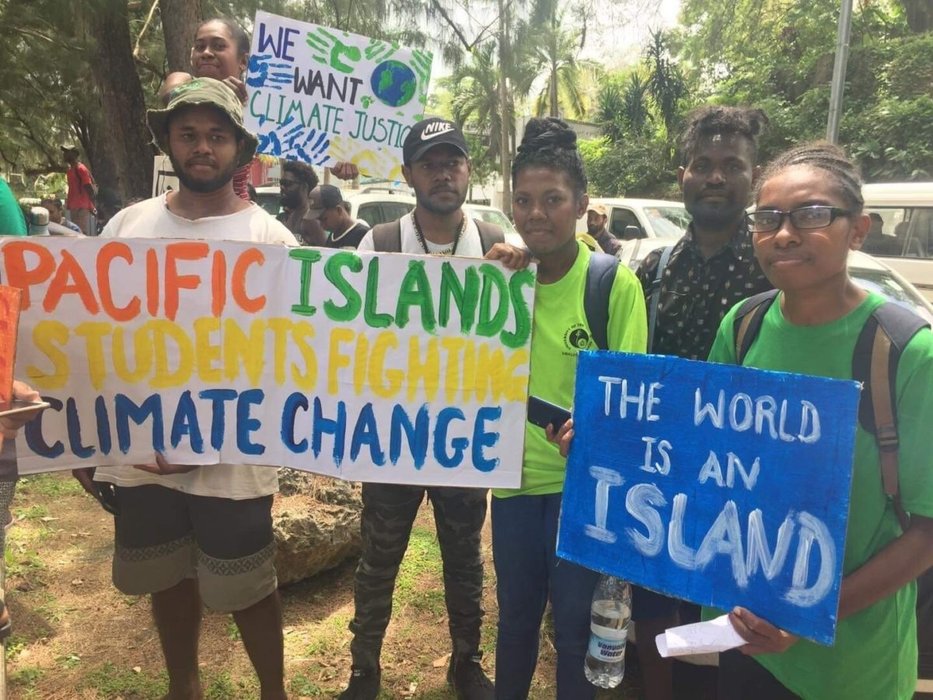
Last week, the International Court of Justice (ICJ) issued a landmark Advisory Opinion on States’ obligations regarding climate change. This was a pivotal moment for all those around the world seeking to uphold the right to a healthy environment and the right to a safe climate.
The ruling follows a request from the UN General Assembly for the court to consider States’ legal obligations to protect the environment from the adverse effects of climate change, and the legal consequences under international law for failing to do so.
It marks the culmination of a six-year campaign by law students in Vanuatu and other Pacific Island States, who successfully pressured their governments to initiate the process through the UN General Assembly.
Following the consideration of extensive evidence submitted by 96 States and 11 international organisations, the ICJ found that a wide range of human rights and environmental laws and treaties convey legal obligations which apply to all States regardless of their ratification of climate treaties.
Significantly, the ICJ made explicit reference to how the right to a healthy environment is ‘a precondition’, ‘inherent’ and ‘essential’ for the enjoyment of other human rights, concluding:
‘In so far as States parties to human rights treaties are required to guarantee the effective enjoyment of such rights, it is difficult to see how these obligations can be fulfilled without at the same time ensuring the protection of the right to a clean, healthy and sustainable environment as a human right.’ (ICJ Advisory Opinion, para 393).
In sum: it is unviable for States to guarantee human rights without also upholding the right to a clean, healthy and sustainable environment. 164 out of 193 UN states now recognise this right, attesting to its growing significance as a tool for environmental protection and a vital element of the international human rights framework.
Scotland’s wake-up call
This must be a wake-up call to the Scottish Government, who dropped their much vaunted Human Rights Bill from the Programme for Government in 2024. The sense of betrayal remains raw for many human rights and equalities groups, even as the Government takes steps to rebuild momentum and reaffirm their intentions, including through the publication of a revitalised discussion paper earlier this month.
Although the Government seems supportive of incorporating the right to a healthy environment into law questions remain on whether it will be effective and enforceable. For the right to have teeth, public bodies must have a duty to comply and be held accountable if they do not. There can be no compromise which puts profit over planet and the health of future generations.
With Scottish Parliament elections on the horizon in May 2026, and at a time when populist politics, war, and environmental disaster dominate our news cycle, it is incumbent on all progressive parties to ensure that environmental and human rights are front and centre of their manifestos. Politicians must resist calls to ditch or dilute recognition of our fundamental human rights, which are the bedrock of our democracy and our ability to lead healthy and dignified lives.
Europe calls for change
While the pace of change in Scotland remains glacial, internationally, there is halting progress on recognising the right. Hopes were high for the 134th Session of Ministers of the Council of Europe, held in May, where European governments had the opportunity to secure an additional binding protocol to the European Convention of Human Rights recognising the legal right to a clean, healthy, and sustainable environment.
The European Court of Human Rights remains the only regional human rights court that has not yet recognised the right to a healthy environment as an autonomous right. The Court currently lacks a clear legal foundation to establish positive obligations for members States, but the adoption of a dedicated protocol could provide this while strengthening the coherence and efficacy of Europe’s legal system.
ERCS, together with Friends of the Earth and Wildlife & Countryside LINK, coordinated a letter with over 60 other civil society organisations urging UK Ministers to endorse calls for a legally binding instrument. Despite the meeting ending with minimal progress, it pointed to an unmistakeable direction of travel, with a growing movement of citizens across Europe united in demanding change.
The power of the law
Last year’s groundbreaking KlimaSeniorinnen judgment, in which a group of senior Swiss women took the Swiss government to the European Court of Human Rights over the growing threat to their health from heat waves made worse by the climate crisis, signalled to the type of impact a dedicated protocol could have.
The court ruled that the Swiss government had an obligation to reassess and strengthen its climate change plans, but was forced to rely on creative interpretations of existing rights (in this case the right to family life), and critics remain concerned that current provisions are fragmented, indirect and legally fragile.
Conclusion
The ICJ decision reaffirms the importance of clear and robust environmental obligations in international law, highlighting how States have a duty to:
‘Use all means at their disposal to prevent activities carried out within their jurisdiction or control from causing significant harm to the climate system and other parts of the environment’ (ICJ Advisory Opinion, para 457).
The ICJ decision is historic and follows a similar Advisory Opinion published by the Inter-American Court earlier this month, which stated that there is a human right to a stable climate and States have a duty to protect it.
Such legal opinions pave the way for litigation against States who fail to prevent environmental harm, including through claims for restitution and reparation, which could spur greater climate action by governments around the world.
While the pace of change has been frustratingly slow, we have reached a new milestone in the evolution of environmental and human rights law. ERCS will make sure that whoever is in power after the next election, our government’s duty to protect our right to a clean, healthy and sustainable environment can no longer be ignored.
Benji Brown, ERCS advocacy officer




